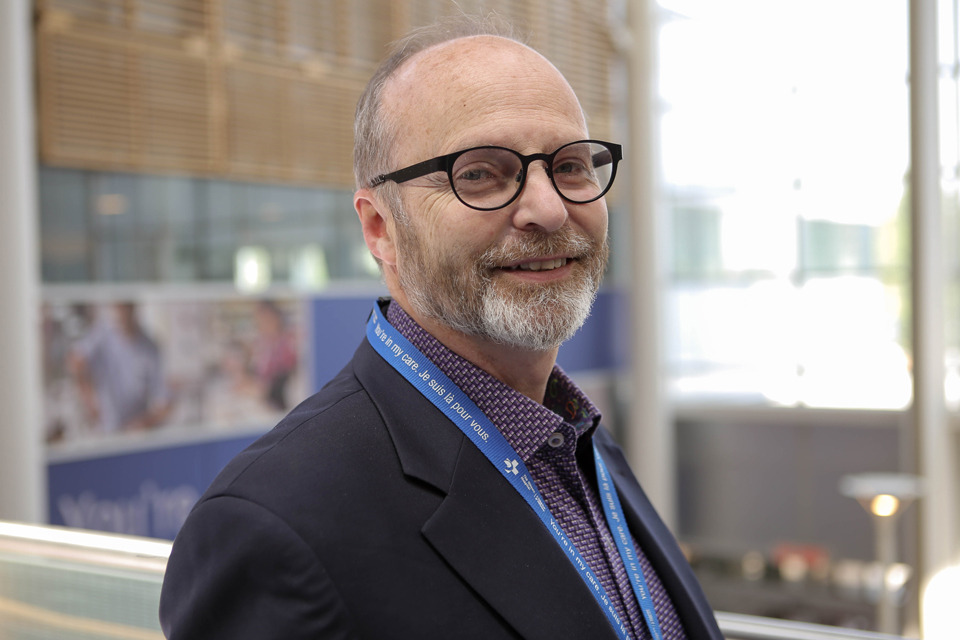Two of the top researchers in their fields from the University of Ottawa Faculty of Medicine have been announced as recipients of one of the premier accolades in science.
Dr. Ruth Slack and Dr. Ian Graham have been elected by their peers to join the Royal Society of Canada (RSC) as Fellows, emblematic of their innovation and renown as the best in their fields. Fellowship includes sitting on panels to advise policy-makers on decisions of great impact such as health care. Already, the two have led advances in patient care in Canada and beyond.
The work of Dr. Slack, at the uOttawa Brain and Mind Research Institute, gives new hope to Canadians affected by brain damage. Her team has discovered that mitochondria, a cell’s energy factories, play a central role in a stem cell’s decision to either remain a stem cell or proceed to develop into a neuron (fully functioning brain cell). This finding opens new lines of investigation into neurodegenerative diseases and brain damage where mitochondrial function is impaired, and new doors to potential therapy in neurological diseases.
With an aging population comes an increasing number of Canadians interested in maintaining their brain’s functional integrity, and Dr. Slack’s innovative avenues of research can also potentially unlock mechanisms to enhance overall integrity of the adult brain. Methods to manipulate metabolism or mitochondrial function in the damaged brain can now be explored, and standing to benefit include those suffering from stroke, dementia, concussion, Parkinson’s disease, and brain damage of all forms.
“Our studies have opened exciting new opportunities to improve function in the aging and damaged brain,” Dr. Slack says. “It is a real honour to receive this recognition from the Royal Society of Canada for our work.”
Dr. Graham, of the School of Epidemiology and Public Health and senior scientist at The Ottawa Hospital, is at the forefront of knowledge translation, a new area of research that is reducing costs and improving quality of care and health outcomes. Dr. Graham enhances patient care in Canada and abroad by using a social science lens to develop tools and frameworks to integrate research findings into everyday clinical practice. Studies indicate that up to half of patients do not get treatments of proven effectiveness, and up to a quarter receive care that is not needed or potentially harmful, says Dr. Graham, meaning health care systems are not as efficient as they could be, nor patient outcomes optimized.
It has been estimated that $170 billion in research funding is wasted in part because the findings from the research are not being used by health care systems, doctors, nurses, other health care providers and patients. Dr. Graham’s knowledge-to-action framework is one of the most widely used to guide practice change, and he has become internationally renowned for the theory and tools he has developed to ensure research is considered when decisions are made about Canadians’ health.
“We often hear it takes 17 years for as scientific discovery to make its way into routine health care practice, and as a patient, a taxpayer, a researcher, this is far too long,” Dr. Graham says. “Knowledge translation research is beginning to reveal how we can reap the benefits of our investments in research as quickly as possible.”
As Fellows of the RSC, Dr. Slack and Dr. Graham will be adding to the impact they have on society by sharing their expertise with policy-makers to help inform decisions that affect people across the country. The Faculty of Medicine is proud to showcase them as symbols of dedication to research excellence and patient care, principles it holds dear.
Considered the highest academic accolade, becoming a Fellow of the RSC is a distinction towards which many scientists strive. Established in 1883 under an Act of Parliament, the Society elects exceptional Canadian in the arts, the humanities and the natural and social sciences with distinguished lifetime accomplishments to join them as Fellows.
The two researchers will be recognized via official ceremony in November.

- The RSC was established in 1883 under an Act of Parliament as “the senior collegium of distinguished scholars, artists and scientists in the country.”
- The Society has great prestige, having handpicked only 2000 Fellows since their inception.
- Founding Fellows include medical heavyweights Sir Sanford Fleming and Sir William Osler.
- Fellows are considered the best in their fields, serve the Royal Society and Canadian society in a number of ways including electing fellow members and forming expert panels to inform government and other organizations on matters of public importance.
Media inquiries
Amélie Ferron-Craig
Media Relations Officer
University of Ottawa
Cell: 613-863-7221
[email protected]


